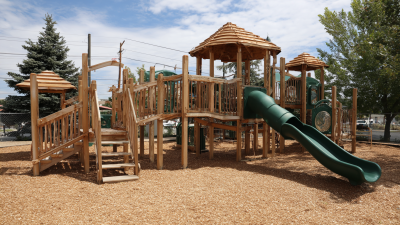 +86-13901441113
+86-13901441113




Garden Play is increasingly recognized as a critical component of child development, providing unique opportunities for engagement with nature that traditional play settings often lack. According to a report from the National Association for the Education of Young Children (NAEYC), outdoor play directly correlates with significant improvements in children's cognitive, social, and emotional development. Research shows that children who engage in nature-based activities exhibit heightened levels of creativity and problem-solving skills, promoting a sense of independence and confidence (Wells & Lekies, 2006).

Furthermore, a study published by the University of Exeter revealed that children who spend more time in green spaces demonstrate better mental well-being and reduced stress levels. As societal trends increasingly favor urban living, the need to incorporate Garden Play into childhood experiences becomes essential, helping to cultivate resilience and well-rounded development in today’s youth while fostering a lifelong appreciation for the environment.
Exposure to nature through garden play significantly enhances children's cognitive development. According to results from the PROmoting Early Childhood Outside randomized trial, outdoor play not only benefits children's health and well-being but also positively impacts their learning outcomes. Specifically, time spent outdoors provides opportunities for experiential learning, fostering critical thinking and problem-solving skills vital for cognitive development. Educators emphasize that engaging children with nature helps them develop a sense of curiosity and encourages them to explore their environments, which are essential elements in cognitive growth.
Furthermore, research indicates that incorporating nature-specific outdoor learning into early childhood education leads to measurable improvements in socio-emotional and academic skills. A systematic review highlighted that such interventions not only pique children's interest in the natural world but also promote mental well-being. Acknowledging these benefits, it is crucial for educational institutions to integrate consistent outdoor play into their curriculums, allowing children to connect with nature while enhancing their cognitive abilities, ultimately preparing them for a lifetime of learning and environmental stewardship.

Engaging children in garden play not only nurtures a love for nature but also significantly influences their physical health. Recent statistics indicate a profound link between outdoor activities and health outcomes. For instance, records from Sport England's Active Lives Adult Survey Report highlight a surge in participation in physical activities, demonstrating the increasing recognition of the necessity for regular exercise. Physical activity is crucial for combating issues such as low physical activity-related cardiovascular diseases, which have continued to rise, emphasizing the urgent need for effective interventions.
Moreover, studies focusing on the psychosocial benefits of outdoor green exercise reveal that nature-based activities can yield substantial mental health improvements. Nature-based interventions (NBIs) have garnered support through systematic reviews illustrating their effectiveness in enhancing well-being and mitigating stress. The 2025 Position Statement on Active Outdoor Play emphasizes the essential role of active outdoor play in childhood development, advocating for policies that encourage outdoor physical activities. By integrating garden play into children's routines, we can leverage these benefits, fostering healthier lifestyles and improved mental health outcomes for the younger generation.

Engaging children in cooperative garden activities not only nurtures their connection to nature but also significantly enhances their social skills. According to a report by the American Academy of Pediatrics, children who participate in outdoor play and collaborative tasks demonstrate improved communication and teamwork abilities. Garden activities require children to work together towards a common goal, fostering essential interpersonal skills such as sharing, negotiation, and problem-solving. These experiences in a natural setting create opportunities for peer interactions that are crucial for healthy social development.
Furthermore, a study highlighted in the Journal of Environmental Psychology found that nature-based activities can reduce social anxiety among children. Participants in garden projects felt more comfortable collaborating with their peers, as these environments promote relaxation and openness. The combination of physical activity and the calming effects of nature encourages positive interactions, ultimately leading to lasting friendships. Integrating cooperative gardening into educational programs can provide children with valuable opportunities to learn essential social skills, equipping them to thrive both inside and outside the classroom.
Numerous studies highlight the significant influence of nature on emotional well-being, particularly in children. Engaging in garden play allows kids to connect with their environment, fostering a sense of peace and happiness. Nature's inherent beauty and tranquility can alleviate stress and anxiety, creating a calming effect that enhances children's mood. For instance, exposure to greenery has been shown to lower cortisol levels, a key stress hormone, thereby promoting relaxation and improving overall emotional health.
Furthermore, garden play encourages imaginative exploration and creative thinking. As children interact with plants, insects, and natural elements, they engage their senses, inspiring curiosity and fostering emotional resilience. This outdoor play not only helps in developing fine motor skills but also cultivates empathy as children learn to care for living things. The benefits of nurturing plants and witnessing their growth can instill a sense of accomplishment and pride, contributing positively to a child's self-esteem and emotional stability.
Research emphasizes the significance of outdoor learning, particularly through garden play, in enhancing children's academic performance. A study conducted by the University of Illinois found that students who engage in outdoor learning experiences often show a marked improvement in their standardized test scores, with a reported increase of up to 20% in mathematics and reading assessments. This is attributed to the hands-on, experiential learning opportunities that outdoor environments provide, which foster critical thinking and problem-solving skills.
Furthermore, the National Wildlife Federation's report highlights that children who participate in nature-based activities show improved attention spans and concentration levels. Specifically, it was noted that children exposed to green spaces score higher in attention restoration tests, resulting in better classroom behavior and more effective learning. As educators increasingly integrate garden play into their curricula, the long-term academic benefits underscore the importance of such initiatives in promoting holistic child development, equipping children with both academic and social-emotional skills vital for their future.





